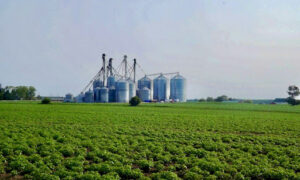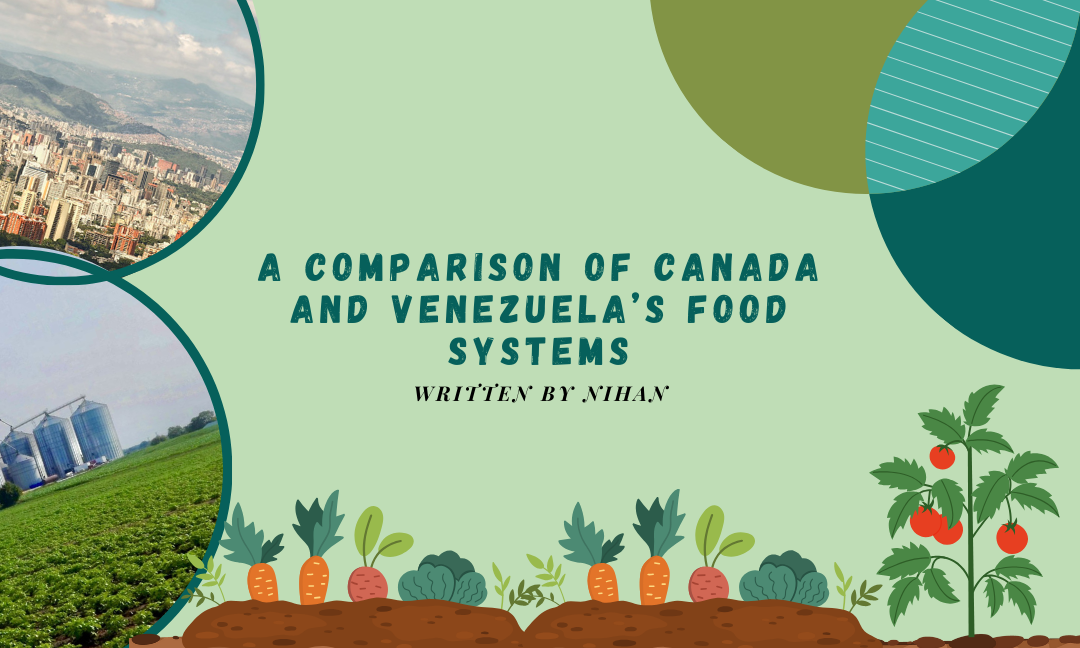Written by: Nihan Ozturk
Edited by: Jelena Mandic
Designed by: Nihan Ozturk
Published by: Maryam Khan
Before any comparisons regarding this sadly little known concept, it is important to understand the minimal requirements of a solid functioning food system that allows a demographic to thrive. This article will be comparing two countries that have very distinct circumstances when it comes to food production, while spontaneously underlining how important it is to have a decent food system.
Prior to being ready for consumption, food must go through three major steps that need labour and energy for effectiveness. These are production, processing, and distribution with consumption being the fourth step. Keep in mind that a food system is far more complex, and that this is only a simplification.
Production is the starting point where landowners or any labourers in the agriculture industry use their knowledge of crop and/or livestock raising, land, and equipment in order to produce resources that are ready to be passed on to the food processing industries where food is to be packaged, stored, or processed. The processing aspect is complex as well as crucial, with its industries ensuring that the foods produced are safe to eat. A simple example of this would be washing and packaging a patch of newly harvested apples. Distribution would be the last step before consumption and it is the step that involves the selling of the processed products to the public. Whether it is publicly in supermarkets, grocery stores, and restaurants. Or privately in a farmer’s market and/or CSA’s. An ideal food system must live up to these protocols and policies. Not to mention having labourers and waste management. The best way to deduce the efficacy of a country’s food system is to observe the most recent statistics.

Canada as a country is undoubtedly known for many things. One of them being the food system. Alongside Sweden, Japan, Finland, and Austria, Canada was one of the top performers in the Food Sustainability Index in 2021 and still is in the top ten in the most recent statistics. These countries are well known for being able to manage food waste and nutritional challenges. According to a 2022 survey, around 18% of Canadian families experienced food insecurity, a relatively low number in comparison to other countries. While poverty is an ongoing problem, the main concern related to the food industry is the waste of food. Canada’s agriculture system has been known to be self-sufficient and even produces more than it can consume. The country is also the fifth largest exporter of agricultural food in the world, and with the unfortunate 60% yearly food waste, it is safe to say that the country has enough to eat. Although the waste management system is undergoing development, Canada’s food system has been sustainable and effective overall.

With the high poverty percentages, Venezuela’s food security has been going downhill for quite some time. Hunger has been a major factor in the migration of 7 million Venezuelans. Experts from the UN have also requested the government of the country to act against this dilemma, but it came to no avail. Many things are blamed for this problem of which includes the Maduro Government’s attempt of dealing with the already crippling economy, which had included printing a large amount of money for the purpose of relieving the dire situation, only to make the inflation worse. The country’s heavy reliance on food imports rather than producing its own is another contributing factor to the current crisis. With the economic collapse and the decrease in available healthcare, it is no surprise that many Venezuelans want to leave their country.
According to the 2022 Food Security Index, the country’s placement is in the 8th last place with an overall score of 42.6%. This number is determined by averaging the affordability, availability, quality/safety, sustainability, and adaptation percentages. Furthermore, recent statistics suggest that nearly 90% of the country lives in poverty and half the population’s families do not have basic food security. Needless to say, there have been some improvements, but Venezuela unfortunately does not meet the basic standards of a food system.

Works Cited
Canadian food system, 10 November 2023, https://agriculture.canada.ca/en/sector/canadian-food-system#. Accessed 18 February 2024.
“,.” , – YouTube, 19 May 2023, https://www.sciencedirect.com/science/article/pii/S2772653322000843. Accessed 18 February 2024.
Burger, Mia. “What Makes Up a Food System? Breaking it Down into 4 Parts.” Sustainable Food Center, 10 June 2020, https://sustainablefoodcenter.org/latest/blog/what-makes-up-a-food-system-breaking-it-down-into-4-parts. Accessed 18 February 2024.
CANO, REGINA GARCIA. “Evolving crisis fuels anxiety among Venezuelans who want a better economy but see worsening woes.” AP News, 13 October 2023, https://apnews.com/article/venezuela-crisis-migrants-maduro-food-elections-afabb9dee444128c5ec4593a51e78896. Accessed 18 February 2024.
CANO, REGINA GARCIA. “UN-backed food expert calls on Venezuela to tackle hunger and urges end to economic sanctions.” ABC News, 16 February 2024, https://abcnews.go.com/International/wireStory/backed-food-expert-calls-venezuela-tackle-hunger-urges-107246403. Accessed 18 February 2024.
“The Daily — Study: Food insecurity among Canadian families, 2022.” Statistique Canada, 14 November 2023, https://www150.statcan.gc.ca/n1/daily-quotidien/231114/dq231114a-eng.htm#. Accessed 18 February 2024.
“Everything you need to know about Hunger in Venezuela.” The Borgen Project, 15 June 2023, https://borgenproject.org/everything-you-need-to-know-about-hunger-in-venezuela/. Accessed 18 February 2024.
“Everything you need to know about Hunger in Venezuela.” The Borgen Project, 15 June 2023, https://borgenproject.org/everything-you-need-to-know-about-hunger-in-venezuela/. Accessed 18 February 2024.
“Food Sustainability Index 2021: Just 28 of 78 countries are prioritising agriculture in their international climate commitments.” The Economist Group, https://www.economistgroup.com/group-news/economist-impact/food-sustainability-index-2021-just-28-of-78-countries-are-prioritising#. Accessed 18 February 2024.
“Global Food Security Index (GFSI).” Economist Impact, https://impact.economist.com/sustainability/project/food-security-index/#. Accessed 18 February 2024.
“Government of Canada launches Food Waste Reduction Challenge.” Canada.ca, 19 November 2020, https://www.canada.ca/en/agriculture-agri-food/news/2020/11/government-of-canada-launches-food-waste-reduction-challenge.html. Accessed 18 February 2024.
“Government of Canada launches Food Waste Reduction Challenge.” Canada.ca, 19 November 2020, https://www.canada.ca/en/agriculture-agri-food/news/2020/11/government-of-canada-launches-food-waste-reduction-challenge.html. Accessed 18 February 2024.
Herrera, Marianella, et al. “Food Security in Venezuela: From Policies to Facts.” Frontiers, 22 February 2021, https://www.frontiersin.org/articles/10.3389/fsufs.2021.617907/full. Accessed 18 February 2024.
“Principles of a Healthy, Sustainable Food System.” American Planning Association, https://www.planning.org/nationalcenters/health/foodprinciples.htm. Accessed 18 February 2024.
“Sustainable food.” The Federal Sustainable Development Strategy, https://2019-2022.fsds-sfdd.ca/goals/sustainable-food?wbdisable=true#. Accessed 18 February 2024.
“Venezuela Crisis – What is Happening in Venezuela.” Mercy Corps, https://www.mercycorps.org/blog/facts-venezuela-crisis. Accessed 18 February 2024.
Zhang, Chen, and Paul Burkett. “Maduro: Venezuela produces 94% of its own food in 2022 after importing 80% for over 100 years.” MR Online, 9 January 2023, https://mronline.org/2023/01/09/venezuela-produces-94-of-its-own-food-in-2022-after-importing-80-for-over-100-years/. Accessed 18 February 2024.

